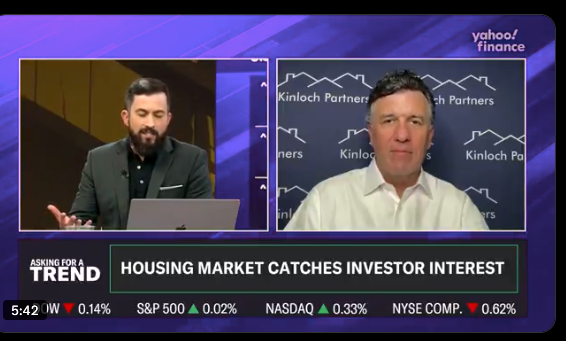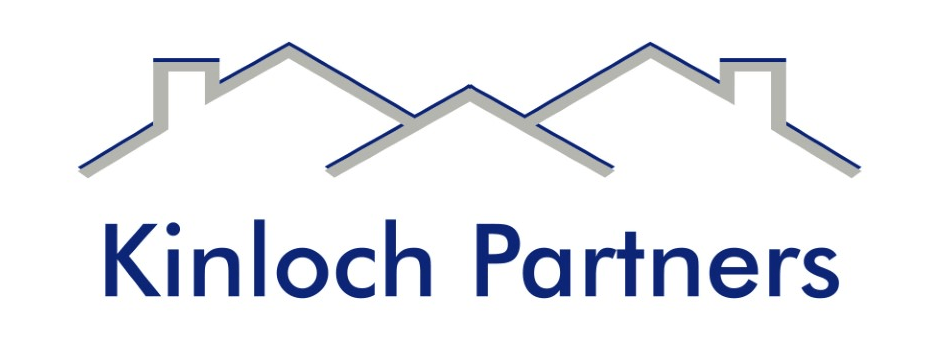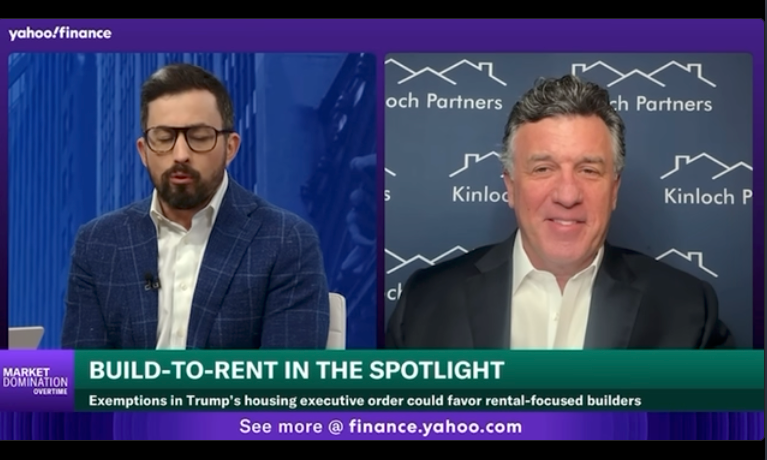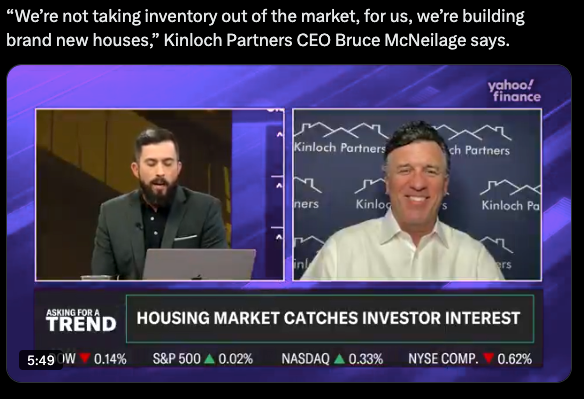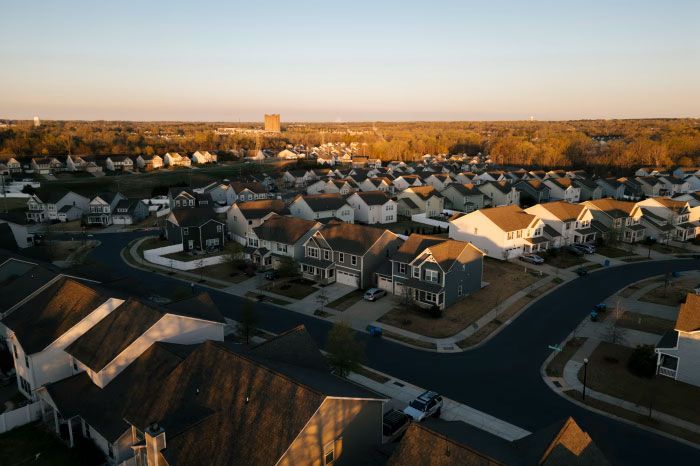By Bruce McNeilage
•
July 28, 2025
There have been a lot of headlines about the number of investors, both large and small, snapping up homes as investments. Kinloch Partners co-founder & CEO Bruce McNeilage explains who these investors are and why so many are getting into housing. To watch more expert insights and analysis on the latest market action, check out more Asking for a Trend here . Click the image above to watch the entire video. 00:00 Speaker A When we talk about these investors moving in, what kind of investors are we talking about, Bruce? Are we talking about relatively are these smaller investors, or these private equity players? Who are they? 00:18 Bruce Sure, they're all the above, right? They're small mom and pop investors. They're buying four and five houses here and there. They're mid-tier companies like us. We'd like to do another 100 to 200 houses by the end of the year. They're larger players, and then there are the ones in between. Now, family offices, sovereign wealth funds, the hedge funds, the REITs, everybody is coming into the market right now. There's been too much money on the sidelines, and we're really starting to see these builders benefit because they have a lot of excess inventory, and folks like us can come in, clean up their inventory here in the next few months, and really uh help them with their profits and buy up their inventory. 01:06 Speaker A So that's interesting, Bruce. So part of the trend here is its home builders have a lot of inventory. That's part of the the driver here. 01:18 Bruce Yeah, absolutely. Mom and pops are having a tough time qualifying for mortgages, right? The interest rates are just too high in the last 52 weeks. You know, you look at Freddie Mac numbers, they've basically stayed the same. We're hovering just under 7%. People cannot afford mortgages right now. So the next best thing is to rent a brand new house. Well, who do you rent a brand new house from? The people that have bought one, or the people that have built one. And so we're really offering something that most people can't get, a brand new house, instead of buying it, you're renting it. 02:07 Speaker A And the smaller investor, Bruce, in particular, that this was really the trend the kind of journal pointed out here, is there a reason right now, Bruce, that smaller investors would be more active? 02:25 Bruce Yeah, sure. So small investors can borrow money from credit unions. They can borrow against their 401k. They can do a lot of different things that larger investors aren't going to do. And when you see the the price of houses coming down, when you see the inventory come uh going up, and when you also see all these builder incentives, it really helps a small investor get in the game, so to speak, because they are getting these discounts from these builders. 03:05 Speaker A And is the business model there, Bruce, for the smaller investor? It's what, you move in, buy a home, make some modest renovations, rent it with the aim of of one day selling it. Is that the idea? 03:22 Bruce Yeah, most people are looking at either buying a new house or what I call a used house and fixing it up. You cash flow it for a number of years, let's say three to five years. It goes up in value, and then you sell it. A lot of people are just in this for the capital gains. Some people are in it for the income and capital gains, but the name of the game is to have positive cash flow from day one and then sell it at a profit at the end. 03:54 Speaker A Is there are there advantages, Bruce, a smaller investor, relatively would have over a private equity player? 04:08 Bruce Yeah, I think they can be nimble. I don't think they have the same rules. They certainly don't have investment committees. And so they can choose to buy a house, rent a house, sell a house, and they can pay what they want to pay. You know, again, they don't have a mandate from an investment committee. So if they want to buy something with a lower cap rate, if they want to buy something with a higher cap rate or something big, small, uh you know, older, uh newer, they can be as nimble as they want where the larger funds can't. They have mandates. You know, they have a buy box and uh and and they've got some restrictions, and we do too. 04:57 Speaker A I'm sure, Bruce, there are some folks who are watching this right now who think, well, hold on a second. Doesn't this trend, doesn't this thing that Bruce and Josh are talking about ultimately make it that much tougher for regular Americans, Bruce, to come in and bid and compete? 05:25 Bruce Yeah, so you would think that, but what we're doing is we're not taking inventory out of the market. For us, we're building brand new houses, not taking inventory out of the market. And then these houses are available in the MLS. You know, you buy houses from the different large builders. Anybody can buy those houses today. It's just people are not. So investors are coming in, cleaning up this inventory, buying the houses, but quite frankly, they're available to everyone. It's just people can't afford them. So it's buying up the houses and making more stock available again, not to buy, but for people that can't buy but to rent.
 Kinloch Partners, LLC, currently is implementing its rent-to-own strategy with 65 homes in Dallas, Ga.
, Murfreesboro, Tenn.
, and Spring Hill, Tenn.
The company has purchased, renovated and re-sold more than 400 single-family homes in greater Atlanta
, creating ownership opportunities for individual families and investment opportunities for individuals and real estate hedge funds. McNeilage also recently sold his interest Solo East, a 121-unit development with affordable condos that recently sold out in East Nashville.
Kinloch Partners, LLC, currently is implementing its rent-to-own strategy with 65 homes in Dallas, Ga.
, Murfreesboro, Tenn.
, and Spring Hill, Tenn.
The company has purchased, renovated and re-sold more than 400 single-family homes in greater Atlanta
, creating ownership opportunities for individual families and investment opportunities for individuals and real estate hedge funds. McNeilage also recently sold his interest Solo East, a 121-unit development with affordable condos that recently sold out in East Nashville.